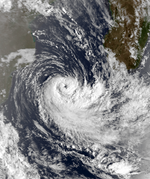1998–99 South-West Indian Ocean cyclone season
| 1998–99 South-West Indian Ocean cyclone season | |
|---|---|

Season summary map
|
|
| Seasonal boundaries | |
| First system formed | September 3, 1998 |
| Last system dissipated | April 24, 1999 |
| Strongest storm | |
| Name | Evrina |
| • Maximum winds | 175 km/h (110 mph) (10-minute sustained) |
| • Lowest pressure | 925 hPa (mbar) |
| Seasonal statistics | |
| Total disturbances | 14 |
| Total depressions | 9 |
| Total storms | 6 |
| Tropical cyclones | 2 |
| Intense tropical cyclones | 2 |
| Total fatalities | 2 total |
| Total damage | Unknown |
| Related articles | |
| Severe tropical storm (MFR) | |
| Category 1 tropical cyclone (SSHWS) | |
| Duration | January 14 – January 19 |
|---|---|
| Peak intensity | 95 km/h (60 mph) (10-min) 975 hPa (mbar) |
| Moderate tropical storm (MFR) | |
| Tropical storm (SSHWS) | |
| Duration | January 28 (entered basin) – February 2 |
|---|---|
| Peak intensity | 65 km/h (40 mph) (10-min) 992 hPa (mbar) |
| Moderate tropical storm (MFR) | |
| Tropical storm (SSHWS) | |
| Duration | January 31 (entered basin) – February 4 |
|---|---|
| Peak intensity | 65 km/h (40 mph) (10-min) 990 hPa (mbar) |
| Intense tropical cyclone (MFR) | |
| Category 3 tropical cyclone (SSHWS) | |
| Duration | March 2 – March 19 |
|---|---|
| Peak intensity | 165 km/h (105 mph) (10-min) 930 hPa (mbar) |
| Intense tropical cyclone (MFR) | |
| Category 4 tropical cyclone (SSHWS) | |
| Duration | April 1 (entered basin) – April 10 |
|---|---|
| Peak intensity | 175 km/h (110 mph) (10-min) 925 hPa (mbar) |
| Moderate tropical storm (MFR) | |
| Tropical storm (SSHWS) | |
| Duration | April 21 (entered basin) – April 24 |
|---|---|
| Peak intensity | 65 km/h (40 mph) (10-min) 992 hPa (mbar) |
The 1998–99 South-West Indian Ocean cyclone season was a quiet season that had the fourth-lowest number of days with tropical storm or tropical cyclone activity. Most of the storms formed either in the Mozambique Channel or in the far eastern portion of the basin, with five storms crossing from the adjacent Australian basin east of 90° E. As a result, few storms impacted Madagascar, and none made landfall on the African continent. Throughout most of the season, there was below-normal sea surface temperatures in the Indian Ocean east of Madagascar. In February, typically the peak in activity, Réunion island recorded its highest average monthly pressure since 1953. Due to generally unfavorable conditions, there were only six tropical storms tracked by the Météo-France office (MFR) on Réunion. There were only two tropical cyclones – a storm with winds of at least 120 km/h (75 mph).
Activity began late, with the first tropical storm – Alda – forming on January 16, the third latest ever recorded at the time. Alda formed in the Mozambique Channel, which was one of few favorable areas for tropical cyclogenesis in the season. It brought rainfall to southwestern Madagascar that alleviated previously dry conditions. The next five tropical storms either originated or crossed into the adjacent Australian basin, where storms were monitored by the Bureau of Meteorology (BoM). Both Tropical Storm Chikita and Tropical Cyclone Davina brought beneficial rainfall to the Mascarene Islands. The latter storm caused two drowning deaths on Réunion and caused some crop damage. The strongest storm – Evrina – peaked as a strong cyclone in the Australian but weakened upon crossing 90°E, with 10-minute maximum sustained winds of 175 km/h (110 mph) in the basin. The final storm was unnamed, crossing from the Australian basin on April 21 as a minimal tropical storm before quickly dissipating. There were also several tropical disturbances or depressions, many short-lived. The first of these formed on September 3 in the northeastern portion of the basin, and there was a tropical depression in February in the Mozambique Channel that approached tropical storm status.
...
Wikipedia












